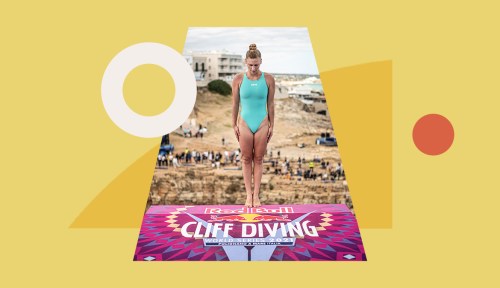‘I’m a Pro Cliff Diver, and This Is My Number One Secret for Facing My Fears’
Professional cliff diver Ellie Smart talks about the techniques that help her get into the right headspace ahead of a major competition.

Although she may be a professional cliff diver, Ellie Smart swears she’s not an adrenaline junkie. “It makes me terrified,” she admits. “If you put me up on a 20-meter platform right now in this second, I wouldn’t do it.”
For her, getting to a place where she can confidently attempt a dangerous dive takes meticulous mental prep. “We have a saying in cliff diving: If you’re not afraid, you shouldn’t do it,” Smart says. She points out that fear is a natural physiological response to danger that protects us by heightening our awareness and increasing our adrenaline. “There’s a level of fear that’s really important to have,” says Smart, 26, who fell in love with sports psychology as a collegiate diver at UC Berkeley, then went on to get her master’s degree in sports and exercise science with an emphasis on human performance.
She says that the trick to harnessing fear so that it’s helpful is not letting it get to the point where you spiral into a rabbit hole of “what ifs,” which will increase your chances of making a mistake. “Having fear, but controlling that fear is key in our sport,” she says.
Smart’s already started the process of getting her nerves in check for her next big dive, coming up on June 4. As long as the conditions cooperate, she’ll likely be attempting the most difficult dive ever done by a female competitor, while jumping off of Boston’s Institute of Contemporary Art into the Boston Harbor. It’s the first stop of the 2022 Red Bull Cliff Diving World Series, and Smart is the only American woman on the permanent roster.
So how does she get her mind in the right place to take on what some consider the “original extreme sport?”
Her number one strategy for managing fear
Smart trains regularly at an Olympic diving pool with a 10-meter high platform, but many of her dives are from 20 meters or higher. So much of her training takes place inside her head. “Visualization is huge,” she says.
Starting at least a couple of weeks before a major competition, she’ll start setting aside time to close her eyes and envision herself stepping out onto the platform. She’ll picture exactly what a jump will look like, and think about how it will feel in her body. That way, when it’s time to do the actual dive during a competition, it will almost feel like she already did it. “It’s not so foreign,” she says.
Research has shown that visualizing yourself succeeding can have a positive impact on performance, and it’s a strategy that can work for anyone before a big event—whether that’s racing a marathon or giving a major work presentation. “Visualization is one of the most powerful techniques for achieving optimal performance because it directly impacts our neurology that is essential for rapid, fluid execution of motor skills, managing emotions, and dealing with stress,” Eric Bean, PhD, CMPC, executive board member of Association for Applied Sports Psychology, previously told Well+Good.
Essentially, imagining a scenario vividly enough activates the same neural patterns as doing the activity. The more senses you can involve (thinking about what it looks like, what it sounds like, what it smells like, etc), the more powerfully this technique will work.
What it takes to quiet the mind
We all know how fast our minds can race in the hours before doing something stressful. Smart stays focused by avoiding Instagram or anything else that reminds her of “real-life stuff.” She puts on her headphones to cut out the rest of the world by listening to the same song on repeat. (During her last competition, it was Justin Beiber’s “Ghost.”)
Although she used to avoid breathwork (“I don’t know why, but I hate when people tell me to breathe,” she says, with a laugh), Smart now recommends it as a way to help calm the nervous system. Her go-to technique is one her coach taught her called box breathing: She breathes in for the count of two, then out for the count of two, which she repeats while envisioning a box with a different side lighting up on each in or out breath.
The power of taking a moment for yourself
Finally, Smart centers herself with a pre-competition ritual that gets her in a healthy headspace. “I always go and just sit at the edge of platform, look down and take a second of appreciation for where I am and what I’m doing,” she says. “For me, that moment is kind of like just accepting the fear and the danger that comes with the sport I do. But also reminding myself that this isn’t something new—I’ve been diving since I was 5 years old. I’ve put the hours in at the pool and the gym, and I know what I’m doing.”
It’s not only a reminder of how prepared she is, but also a moment of gratitude for the opportunity to do something she loves.
Oh hi! You look like someone who loves free workouts, discounts for cutting-edge wellness brands, and exclusive Well+Good content. Sign up for Well+, our online community of wellness insiders, and unlock your rewards instantly.
Sign Up for Our Daily Newsletter
Get all the latest in wellness, trends, food, fitness, beauty, and more delivered right to your inbox.
Got it, you've been added to our email list.










